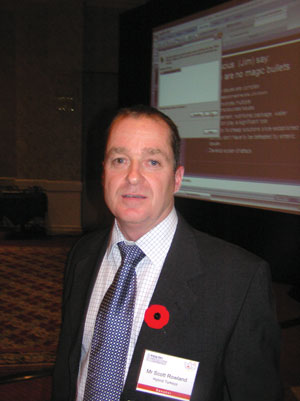
Hybrid’s H1N1 Experience
Jim Knisley
Features New Technology ProductionThe primary breeder has changed things within its facilities and learned valuable lessons
In a normal flu season what happened at Hybrid Turkeys’ grandparent
breeding facility near Kitchener would likely have been treated as a
“man bites dog” story.
In a normal flu season what happened at Hybrid Turkeys’ grandparent breeding facility near Kitchener would likely have been treated as a “man bites dog” story.

|
|
| Not a Normal Flu Scott Rowland, director of operations for Hybrid Turkey, said Hybrid learned very quickly that human health concerns surpass those of agriculture.
|
In Hybrid’s case, it is likely an employee just coming down with the flu passed it on to the turkeys. Normally, this would have attracted the attention of the industry and a handful of government employees. But this was far from a normal season.
The flu was the H1N1 strain that had already prompted a worldwide pandemic warning and had governments rushing to get sufficient doses of vaccine out to the public.
The local, national and international media, which had been on H1N1 alert since spring, jumped on the story.
Scott Rowland, director of operations for Hybrid Turkey, said for Hybrid the story began Oct. 9 when a drop in egg production was identified. Not knowing the cause, the company put in place a self-imposed quarantine. On Oct. 17, it was confirmed that the turkeys had H1N1 but the type hadn’t been confirmed. On Oct. 19, officials confirmed that it was the strain of H1N1 called H1N1 Novel infecting people.
Hybrid had already seen something similar in Chile in mid-August.
What Hybrid was seeing at its facility outside Kitchener, and had seen two months earlier in Chile, went against the results of three independent trials in Europe and elsewhere. In those trials turkeys were exposed to H1N1 and the conclusion was that turkeys can’t get H1N1.
But Rowland said the trials were done with commercial birds. “Turkey breeders have much more exposure to humans,” he said.
On Oct. 17, when it was first identified as an H1N1 case, Rowland said the calls began coming in. There were calls from the Ministry of Health, the Ministry of Labour, Ontario’s Chief Veterinarian and the Canadian Food Inspection Agency (CFIA).
The CFIA quickly backed out of the picture but the Ministry of Health and Ministry of Labour remained to monitor the situation.
“We learned very quickly that human health concerns quickly surpass agriculture,” he said.
When the information about a turkey farm coming down with H1N1 became public it was a hot topic for a lot of people. The media got involved in a major way and there was a hunt for the affected farm.
One television network was so determined and disruptive that the head of network news had to be called and advised that if they didn’t back off legal action could result.
“We were not prepared for the human element,” Rowland said.
The company brought in specialists in media relations. Their assistance and guidance was much needed and proved more than helpful.
A key to handling the media and the public was to provide clear communication with all the depth, detail and technical information provided in advance of any press conference.
“Don’t assume that people understand your industry,” he said.
The media was also provided with industry contacts and quotes and the key points were driven home.
For example, Hybrid stressed from day one that H1N1 doesn’t infect the turkey meat and that in any event those birds were breeders and never destined for a dinner table. They also stressed the self-imposed quarantine and the suspicion that the turkeys caught the disease from a person and not vice versa.
The company also benefited from press conferences by senior government officials, who also stressed that there was no threat to turkey meat and that everything was controlled.
He quoted Dr. Deb Stark, Ontario’s chief veterinarian, who said: “Turkeys get the flu. They get over the flu. Life goes on.”
But the disease has changed things within the Hybrid facility.
All employees are now required to wear a mask, rubber gloves and a gown, and there are more changes coming. Employees had been asked to get vaccinated, and the few who didn’t must now wear a bigger mask.
Anyone visiting the facility must get vaccinated in advance before they will be allowed on the premises.
While these changes will protect the people, they will also protect the birds.
But Rowland said Hybrid learned that it has to take a long-term view of potential threats. For example, they know that H3N2 is out there in the swine industry and, although it doesn’t affect people and hasn’t hit turkeys, you can never be complacent. You need to plan and prepare to ensure you are as ready as you can be. Remember that H1N1 wasn’t supposed to affect turkeys either.
Print this page